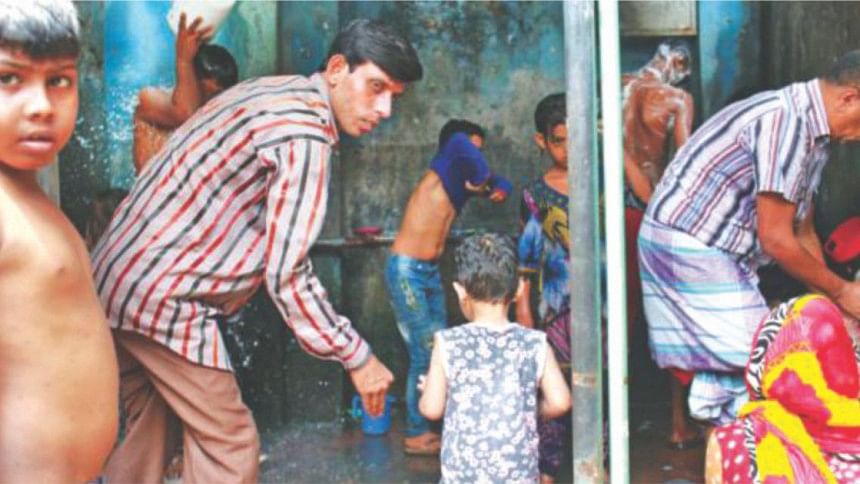Mirpur Camp in Numbers

In a world post-Syria, 'refugee' has almost become a dirty word. It is no longer an individual seeking solace from a terrible monster or a family leaving everything they have known behind because a fire has come to consume them. No longer does the word invoke the kind of empathy it should have; now refugees are violent people, harbouring perversions from savage cultures, ready to rob us of our national values. Thus, in hindsight, when Bangladesh's Supreme Court ruled to finally acknowledge our own so-called refugees, the Urdu Speaking camp dwellers, as Bangladeshi nationals we all heaved a sigh of relief of finally getting ourselves rid of the "refugees". But before resting on the laurels of an achievement borne a decade ago, there remains plenty of work left.
A recent research conducted by the Islamic Relief Bangladesh in the year 2016 paints quite a grim picture of the reality of the 'newest' 44-year old Bangladeshis in our country. Conducted in 20 camps in Mirpur of over 116 spread across the country, it seems the basic rights of citizenships haven't arrived with the label of citizenship. Of 395 households surveyed, it was found that only 3 percent respondents had an income of over 15,000 taka. The national average income of families in urban areas stands at 16,475 taka. 97 percent of all surveyed admitted to having an income below the national average. While lack of education could explain this to some extent- only 2 percent have an HSC degree with a mere 1.5 percent having graduated (interestingly only 1 percent have had a Madrasa education) - another is simply the lack of opportunities. Having just acquired some of the benefits of being a citizen, previous generations did not have easy access to education. Secondly, the Urdu-speaking community still faces a lot of discrimination and find themselves restricted from mainstream spaces, typecast into low-paying jobs.
When it comes to their Civil and Political Rights, a sinister trend begins to develop. Of those surveyed, 77.8 percent have no Birth Certificates yet almost 85 percent of them received their National Identity Cards. A focus group discussion revealed that the respondents knew of the importance of both NID and Birth Certificates, in terms of opening a bank account, applying for a job, to avail certain government service etc. Interestingly, of the 307 respondents without Birth Certificates, only 13 percent ever actually applied to get theirs. The issue of passports is another bone of contention. 5 percent of the respondents actually have a passport, many of those who don't describe horror stories of when they applied. Some claim to have been asked to "prove their citizenship" whilst others were said to be rejected on the basis of not having a "permanent address" with their Geneva Camp addresses being refused all recognition. To gauge their national involvement, it was further found out that 85 percent were voters and almost 98 percent of them had voted in their first and only election so far when they were granted their National IDs.
If there is some good news, it is lumped together with the bad. While 97 percent of the camp dwellers said to have faced no harassment or harm for being camp dwellers, almost 90 percent of them expressed hesitation in moving freely all around the country, their distinct accent and a language demonised as a national pastime being two key reasons. The camp dwellers also said their access to justice lay with the Camp Chairman and Members with 71 percent reporting to have gone to them for help.
An 80 percent drop-out rate and with 34 percent of the children out of school, the academic side of things cannot be classified as rosy. Worse than that are, still, the living conditions. Poor sanitation, lack of hygiene, poor drainage and meager resources all couple to make living in the camps almost an everyday torture. Typically, 10 families share a single room, with one latrine shared by almost 90 families, on a daily basis. Long queues are formed before solitary water pumps every day. The sewage line itself is in shambles and 60 percent of the population lives in constant fear of evacuation and evacuations are common place. While they are encouraged to buy land outside the camp, often times they find themselves without the monetary tools required. The camp dwellers have been called, at least officially, as citizens of the country yet over 98 percent are yet to receive any government benefits. They aren't called refugees anymore yet the disdain attached to them has evidently remained.
Islamic Relief Bangladesh is one of the NGOs to operate in the camps and readily provides a range of services from paralegal work to even providing donations and conducting various projects. Based on their findings, apart from advocacy and income generation programmes, there needs to be a concentrated and dedicated effort to enjoin to our very own citizens the rights that everyone has and the access to the tools to give those rights to them. When in 2016, the term "bihari" is still carelessly tossed about as a cuss word, let that be a reminder that there remains much more work left.

 For all latest news, follow The Daily Star's Google News channel.
For all latest news, follow The Daily Star's Google News channel. 



Comments